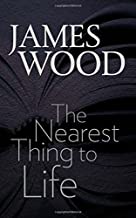The Nearest Thing to Life, James Wood 2015
Wood, the Professor of the Practice of Literary Criticism at Harvard, delivered the Mandel Lectures in the Humanities at Brandeis University in 2013, and they comprise the first three chapters of this slim but profound volume which argues for the value of fiction in today’s world. The fourth chapter consists of Wood’s observations of being an English-born resident of the other Cambridge, 02138 and the implications for homelessness or as he prefers, homelooseness. The book’s title comes from a quote by George Eliot who said that “Art is the nearest thing to life; it is a mode of amplifying experience and extending our contact with our fellow-men beyond the bounds of our personal lot.” Reading it was a wonderful opportunity to revisit many of the authors and books in the courses that Wood teaches at Harvard and which I’ve had the pleasure of auditing. His favorite authors turn up repeatedly—W.G. Sebald, Muriel Spark, Lydia Davis, Virginia Woolf, Alexander Hemon, Henry James, Saul Bellow, Nabokov, Naipaul, Penelope Fitzgerald, and others. He refers to the doubleness of fiction and its ‘not quite’ aspect, both elements of the suspension of disbelief that the author and reader enter together. In the first chapter he examines the reality of mortality and its resultant overriding question, Why? “the wide, skeptical, terrifying freedom of the Why”, as well as its implications for religious belief. I loved his comparison of a novel to the liturgical element of the funeral—the ability to see a ‘life whole’. He observes that the novel is characterized by its struggle between competing elements—instance and form, present and past, free will and determinism, secular expansion and religious contraction. He broadens that to include all of us when he says “We are all internal fiction writers and poets, rewriting our memories.” He praises the ‘serious looking’ of novelists as they “examine the self in all its performance and pretense, its fear and secret ambition, its pride and sadness.” He tackles the challenge of aging in his observations of Knausgaard’s meticulous observations of his life, “To notice is to rescue, to redeem; to save life from itself.” praising Walter Benjamin who observed that ‘the natural prayer of the soul is attentiveness’. Wood is perhaps today’s foremost literary critic and this is a book worth reading, if for no other reason than to be introduced to his universe of outstanding novelists.



